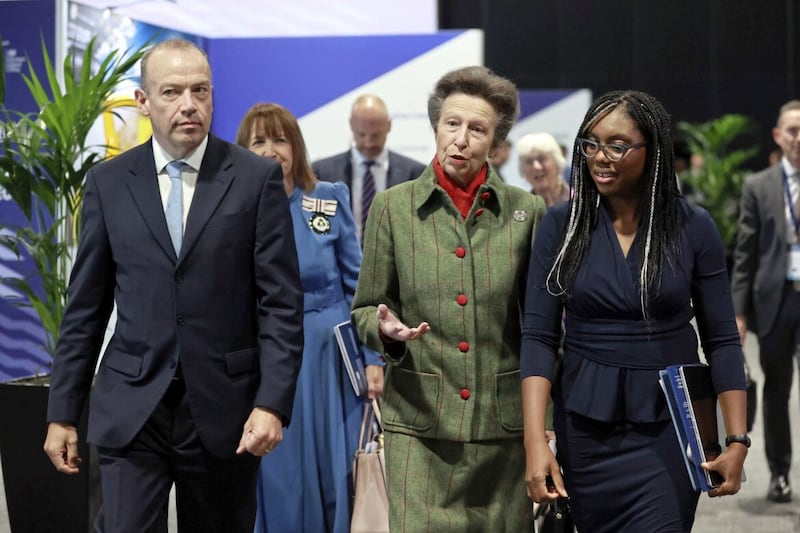ANY local chief executives in Northern Ireland trading in international markets will have a significant challenge keeping up with the divergent economic paths that can been seen across the global economy.
Although the Eurozone economy shrank for two consecutive quarters, many advanced economies are reported to have narrowly missed recession; whilst Asia (particularly India) will see strong growth.
The OECD has forecast world economic growth to rise by 2.7 percent this year and 2.9 percent next year.
Inflation – still tricky
Global inflationary pressures appear to have started to ease especially for food, freight costs and wider energy prices. However, in a bid to curb uncomfortably high inflation rates, the Bank of England and the European Central Bank continue to raise borrowing costs.
The US had also been hiking, but last week the Fed took its foot off the pedal with the first rate-hike pause in over a year.
Their forward guidance has indicated that this pause is a temporary one, with two more interest rate hikes expected later in the year – it will be interesting to see if those rises materialise.
China on the other hand is on a different path. Growth is sitting at 4.5 per cent in China, and inflation is weak.
But the Chinese economy is struggling with lower exports and a floundering property market. For that reason, the People’s Bank of China has reverted to a more dovish stance to help sustain growth.
Inflation has huge consequences for not just interest rates, but living standards, industrial relations and investment levels too.
Unfortunately, the global inflationary outlook is far from certain. One to keep an eye on is European gas prices. Although still significantly lower than last summer’s peak, the natural gas price has risen 60 per cent during the month of June.
Despite decent gas storage levels in Europe, there remains a degree of uncertainty about gas supply constraints.
Reports of some gas-field outage extensions in Norway and a plan to close the Groningen gas field in the Netherlands have influenced recent price rises.
In Europe the importation of Liquid Natural Gas combined with reduced consumption will be important during Winter 2023/4.
UK – some economic growth, but underlying weaknesses too
The CBI published its economic forecast for the UK just last week. Businesses and consumers alike will be relieved that the economy has avoided recession and is now forecast to re-enter growth territory in the second half of this year.
Upgrading our growth forecast from -0.4 per cent to 0.4 per cent is hugely positive, but this good news comes with a reminder that other economic indicators are still far from ideal.
As mentioned above, inflation remains a headache for many countries, the UK included.
In addition, the UK’s labour market is proving very challenging too. With a tight labour market, many firms are still struggling to attract the people and skills they need.
Labour shortages in some sectors combined with a higher cost of living have really put the pressure on. Private sector wages in the UK rose by 7.6 per cent (excluding bonuses) year on year.
This heady cocktail of inflation and labour shortages has also brought about strained industrial relations.
From UK airport staff to medical professionals, the threat of industrial action has once again been hovering over the summer months.
While some employers report that weakened global demand has reduced their vacancy levels, economic inactivity due to record levels of long-term sickness mean that the wage pressure issue is not yet over.
Labour relations
Unfettered wage inflation can have negative consequences – creating further price rises in a self-reinforcing loop. But the negative impact of poor industrial relations also need consideration.
Strikes impact all of us, from lowering economic activity to accessing public services and lowering living standards.
Interestingly, just last week Ibec’s CEO, Danny McCoy, came up to Belfast to give the 8th Annual Sir George Quigley Memorial Lecture.
One aspect of his lecture was around the rising interest in ‘Stakeholder Capitalism’ – which proposes that corporations should not just serve the interests of their ‘shareholders’ but serve the interests of all their ‘stakeholders’ (investors, employees, customers and society at large).
McCoy also pointed out that, when fully adopted, the ‘European Union’s Directive on corporate sustainability and due diligence’ will have implications for Northern Irish firms selling into the EU.
The aim of this Directive is to foster sustainable and responsible corporate behaviour and to anchor human rights and environmental considerations in companies’ operations and corporate governance.
Businesses operating in the EU will have to address any adverse impacts of their actions, including in their supply chains.
Building trust with stakeholders through social dialogue is an important element of stakeholder capitalism.
McCoy told the audience that in the Republic of Ireland social dialogue has been formalised under the Labour Employer Economic Forum (LEEF).
This is a space for important information between employers and employee representatives to be exchanged in the hope that better economic decisions and compromise can be achieved.
Given the importance of good industrial relations in these challenging times, we in Northern Ireland should perhaps consider developing a more formalised ‘social dialogue’ process.
In summary, there is plenty to think about when it comes to global trade and the wider economy.
For business, just keeping up with these trends and navigating the challenges is a full-time job.
For government at the national and a local level - there’s plenty of work to be done to deliver that stable macro-economic environment and sustained growth that firms want to see.??
The sooner we see the local Executive back, the better our chances are!
Angela McGowan is CBI Northern Ireland Director








